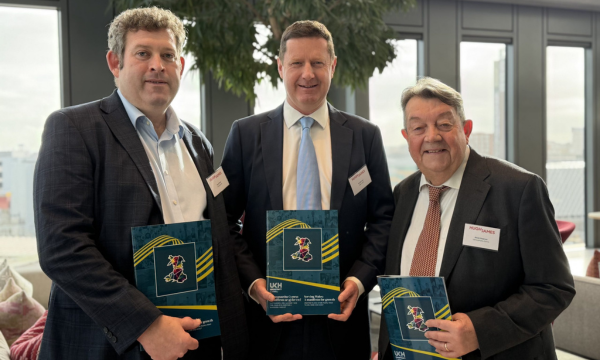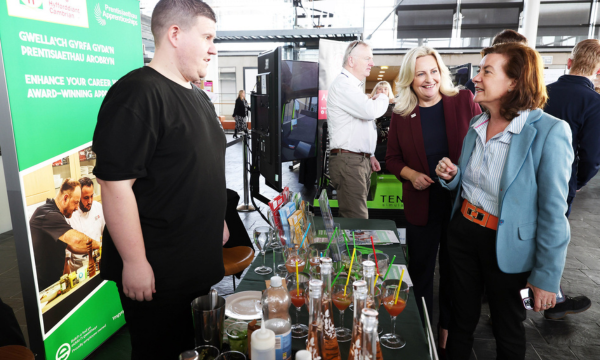Sero along with industry partners has launched a project to pilot green mortgages and identify value difference for low carbon homes
The VALUER research project is a ground-breaking scheme that will see the first mortgages and additional borrowing offered in the UK that recognise home energy efficiency in their affordability calculations. The ‘VALUER Project’ is a collection of industry partners led by Monmouthshire Building Society, The Royal Institution of Chartered Surveyors, Rightmove and zero carbon homebuilder and sustainable energy service provider Sero.
The VALUER research aims to develop understanding, and demonstrate the emerging difference in value, between low and high energy homes. As part of the project, new green mortgages, and additional borrowing products will be made available to two “geofenced” pilot areas in south Wales. This will include a number of new build low energy homes at Parc Eirin in Tonyrefail and also the Eastern High development in Cardiff, as well as existing homes in the area looking to make retrofit energy improvements.
The team will closely monitor product uptake and property values in the pilot areas, to understand the specific features and behaviours that drive the value difference that may emerge, in order that home valuations can better reflect this in future.
The project is funded by the Department for Business Energy and Industrial Strategy, Green Home Finance Innovation Fund, and is supported by the Green Finance Institute who put out an official statement today (29 June).
To support this work, Monmouthshire Building Society will be the first mortgage lender in the UK to adopt the findings from a previous piece of research known as the “LENDERS” project, and adapt their affordability calculation tool to more accurately reflect actual home energy bills. This could potentially increase the maximum affordable mortgage by up to £12k for a very low energy home, compared to a poorly performing property.
Dawn Gunter, Chief Operating Officer from Monmouthshire Building Society said:
“Despite the growing concern around the climate emergency and the widespread acknowledgement that we need to decarbonise homes – currently there is a lack of understanding within the industry about how we put a value on low carbon homes, making it challenging to support members who are buying or looking to adapt their existing property. As a member led mutual, we are committed to leading the way in helping bring about this change and are looking forward to getting this pilot off the ground, which we are confident will be a catalyst for real change in the industry moving forward.”
Rightmove will also be bringing ‘green’ information to their Surveyor Comparator Tool (SCT) that will draw on Energy Performance Certificates (EPC) and energy efficiency information to support surveyors as they compare and value ‘green’ features in homes. They will also use advanced analytics to bring green features to their Automated Valuation Model (AVM) to understand their impact on value.
Tim Bannister, Director of Data Services at Rightmove said:
“Enabling property valuers to assess the value of low carbon homes is going to become increasingly important over the coming years with a growing focus on energy efficiency. Developing tools to help identify low carbon features and present these to property valuers is clearly going to be a key part of this overall jigsaw.”
One of the pilot areas is focused around the Parc Eirin scheme, a new neighbourhood of 225 low carbon, traditional build homes currently being built-out in Tonyrefail, Rhondda Cynon Taff being delivered by project partners, Pobl Living, Tirion Homes, Sero Energy and Morganstone. The new homes will include a mix of solar panels, energy storage and smart energy systems, being installed and managed by Sero Energy, to minimise the energy costs for residents. New home purchasers will be offered pilot mortgage products that include assessments of energy efficiency and other new considerations.
Talking about the VALUER project, Sero’s co-founder, Andy Sutton, said:
“There is little current evidence that the market places a value difference between high and low energy homes. Identifying this value difference is key to enabling building more low energy new homes and to the low energy refurbishments of our existing houses. The end value underpins the finances and showing low energy homes have better future value than high energy homes will help support the higher cost of building or refurbishing these homes.
“It is also very positive to see this project implementing the findings of the Innovate UK part-funded “LENDERS” project, led by Nationwide Building Society, that demonstrated how better account of energy bills could be made in mortgage calculations.”
RICS will work closely to use the findings of the research to review and enhance the guidance they provide to their professional members – whose role is to advise lenders both as to the property value and, potentially, the property risks attached to mortgage lending.
Ben Elder, Global Director of Valuation for project partners, RICS said:
“RICS sets the standards by which all Regulated Valuers operate. We are delighted to be partners to this innovative initiative – which will provide much needed real evidence of how the market is recognising the benefits of energy efficient buildings in ways that can be captured through the valuation and lending process. Green mortgage products are a key way to stimulate interest and awareness of energy efficiency, and support market change.”
Sarah Sayce, of the University of Reading, who is working in an advisory capacity to the project commented:
“Residential buildings are a major source of carbon emissions; moving zero-carbon standards in both new stock and by retrofitting existing buildings is critical to addressing climate change. Whilst mandated government standards will certainly be required, it is important that the private sector supports, encourages and rewards behaviour change by buyers and owners. Differential lending policies, better market data and refreshed guidance to valuers are all key drivers of achieving such change; this project should prove to be a flagship of what can be achieved by working together.”
Further details about the Government’s plans to invest £80 million to reduce carbon emissions from industry and homes, which includes £1.8 million to support the development of innovative green home finance products by lenders, can be found here: https://www.gov.uk/government/news/80-million-boost-to-cut-emissions-from-homes-and-industry
The Green Home Finance Innovation Fund (GHFIF) competition is funded by the BEIS Energy Innovation Programme and further details can be found at: https://www.gov.uk/guidance/green-home-finance-innovation-fund-competition.










